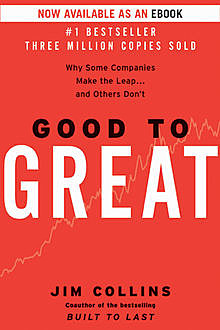Good to great: why some companies make the leap... and others don't
Dit boek is momenteel niet beschikbaar
449 afgedrukte pagina’s
- Jaar van uitgave
- 2011
Impressies
- Ekaterina Kuznetsovadeelde een impressie7 jaar geleden👎Overslaan💤Saai!
Основная мысль - в названии. Очень много воды. На каждое предложение с какой-то мыслью - куча примеров, которые тут же забываются.
- Olga Kovriginadeelde een impressie8 jaar geleden👍De moeite van het lezen waard🔮Verborgen diepten💡Heel leerzaam🎯De moeite waard
- Sanzhar Surshanovdeelde een impressie9 jaar geleden🔮Verborgen diepten
Citaten
- Anna Sorokinaciteerde uit8 jaar geledenIf you had the opportunity to sit down and read all 2,000+ pages of transcripts from the good-to-great interviews, you’d be struck by the utter absence of talk about “competitive strategy.” Yes, they did talk about strategy, and they did talk about performance, and they did talk about becoming the best, and they even talked about winning. But they never talked in reactionary terms and never defined their strategies principally in response to what others were doing. They talked in terms of what they were trying to create and how they were trying to improve relative to an absolute standard of excellence.
- Anna Sorokinaciteerde uit8 jaar geledenIndeed, discipline by itself will not produce great results. We find plenty of organizations in history that had tremendous discipline and that marched right into disaster, with precision and in nicely formed lines. No, the point is to first get self-disciplined people who engage in very rigorous thinking, who then take disciplined action within the framework of a consistent system designed around the Hedgehog Concept.
- Fidan Tofidiciteerde uit6 jaar geledenAvoid bureaucracy and hierarchy and instead create a culture of discipline. When you put these two complementary forces together—a culture of discipline with an ethic of entrepreneurship—you get a magical alchemy of superior performance and sustained results.
fb2epub
Sleep je bestanden hiernaartoe
(maximaal 5 per keer)


